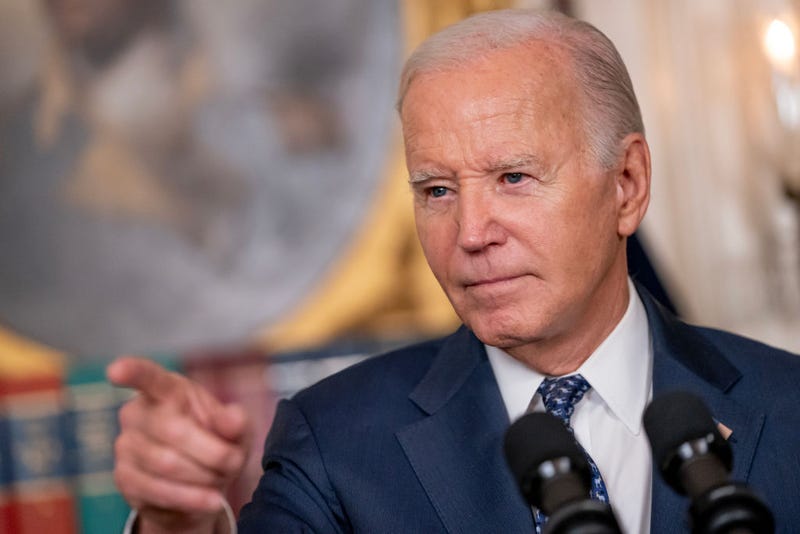
Special counsel Robert Hur is not going to prosecute President Joe Biden for his handling of classified documents but says that Biden's practices "present serious risks to national security."
In a 388-page report released Thursday on Biden's handling of the documents, Hur described the president as "well-meaning" and "elderly" with a "poor memory."
"Making general observations, with a pseudo-medical veneer to them, is out of his bailiwick," explained CBS News Chief Washington Correspondent Major Garrett. "That's not what he's supposed to do. He's supposed to explain the investigation, and it's ultimate decision. Now, the one thing that Robert Hur says in the report, and we should take onboard is, 'well, part of my way of explaining to the public, which has a more than mild interest in whether or not I'm going to charge the President of the United States with a felony, and one of the reasons I'm not going to charge, is because of the way he would present to a jury.' That, it seems to me, at least is within the boundaries."
Although the report found that Biden, 81, "willfully" retained and disclosed highly classified materials when he was a private citizen, it details the reasons why he should not be charged with a crime one of which is how he would come across to a jury, who he says would sympathize with him and find it impossible to convict him.
"At trial, Mr. Biden would likely present himself to a jury, as he did during our interview of him, as a sympathetic, well-meaning, elderly man with a poor memory," Hur wrote. "Based on our direct interactions with and observations of him, he is someone for whom many jurors will want to identify reasonable doubt. It would be difficult to convince a jury that they should convict him — by then a former president well into his eighties — of a serious felony that requires a mental state of willfulness."
"That is something I think you can say he could reasonable discuss in the contours of the report, and not be labeled a hack," says Garrett. "Do I think he laid it on a bit thick? Most definitely."
In more than one instance, the report refers to Biden as having "diminished faculties" with a "significantly limited" memory. One example in the report describes a recorded interview in 2017 as "painfully slow," adding that Biden was "struggling to remember events and straining at times to read and relay his own notebook entries."
"He did not remember when he was vice president, forgetting on the first day of the interview when his term ended ('if it was 2013 - when did I stop being Vice President?'), and forgetting on the second day of the interview when his term began ('in 2009, am I still Vice President?'). He did not remember, even within several years, when his son Beau died," Hur wrote.
In particular area, the report suggests the president did not remember when his son Beau died, something Garrett, and WCCO's Chad Hartman, said seems very difficult to believe.
"Is that too far? It felt like it to me," says Garrett. "Because you can make other observations about the interview without doing that. Because we don't know what he means by that. I don't believe the president doesn't know when his son died. There might have been part of a conversation in which it was unclear or the president didn't understand. That's the kind of declaration that I don't believe is possible. I don't believe any father or any mother doesn't remember when their child died. I just don't. That was laying it on far thicker than was necessary, or to use a lawyer word, probative in discussing how he would present to a jury. That rang the bell louder than necessary, and you can reasonably say, 'well what was the motive for doing it'? Well, then you get into politics, something prosecutors should never be in the arena of in the first place."
In response to the report, White House Special Counsel Richard Sauber and Biden's personal attorney Bob Bauer said Hur's treatment of the president was unfair.
"The report uses highly prejudicial language to describe a commonplace
occurrence among witnesses: a lack of recall of years-old events," the pair wrote in a letter to Hur. "If the evidence does not establish guilt, then discussing the jury impact of President Biden's hypothetical testimony at a trial that will never occur is entirely superfluous."
Sauber and Bauer called the report's repeated references to Biden's memory "gratuitous."
"It is one thing to observe President Biden's memory as being 'significantly limited' on certain subjects. It is quite another to use the more sweeping and highly prejudicial language employed later in the report. This language is not supported by the facts, nor is it appropriately used by a federal prosecutor in this context," the letter continued.
Biden said in remarks from the White House Thursday evening that he was pleased the report cleared him, but he shot down any speculation that he's forgetful.
"I know there's some attention paid to some language in the report about my recollection of events. There's even a reference that I don't remember when my son died. How in the hell dare he raise that," the president said. "Frankly, when I was asked the question, I thought to myself it wasn't any of their damn business"
"The simple truth is I sat for five hours of interviews over two days of events, going back 40 years. At the same time, I was managing an international crisis," he added.
Biden went on to say his "memory is fine."
"For any extraneous commentary, they don't know what they're talking about. It has no place in this report," he said. "I am well-meaning, and I'm an elderly man, and I know what the hell I'm doing. I've been President. I put this country back on its feet. I don't need his recommendation."
